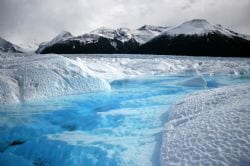Geography professor to lead international climate change research at Lincoln
6 February 2017
An internationally-renowned expert in climate science and meteorology has joined the University of Lincoln, UK, where he will lead multi-national research projects examining the effects of climate change on our weather systems and global landscapes. With more than 20 years’ experience of climate change research, Professor Edward Hanna works to address some of the most […]

An internationally-renowned expert in climate science and meteorology has joined the University of Lincoln, UK, where he will lead multi-national research projects examining the effects of climate change on our weather systems and global landscapes.
With more than 20 years’ experience of climate change research, Professor Edward Hanna works to address some of the most pressing environmental issues affecting society today. As the latest senior appointment to the University of Lincoln’s new School of Geography, he will continue his research examining the links between global warming and major climatic trends, including extreme weather events and the persistent rise in sea levels.
Professor Hanna is currently working with international teams of scientists, including researchers from NASA and the University of Columbia, USA, on projects which aim to advance our understanding of the decreasing mass of the Greenland Ice Sheet and its contribution to a rise in the global sea-level. The Greenland Ice Sheet is a vast body of ice covering approximately 1.7 million square kilometres – roughly 80% of the surface of Greenland.
In a series of recent research publications, Professor Hanna highlighted the rapid increase in melting and mass loss of the ice sheet since the 1990s and attributed these changes to global warming. He has also conducted pioneering work on air-circulation changes over Greenland, which can affect weather conditions downstream over the UK.
His ongoing work with scientists in the USA, The Netherlands and Belgium aims to improve understanding of recent and potential future changes and highlight areas of concern which still need to be addressed.
Professor Hanna explained: “There has recently been a flurry of interest in the Greenland Ice Sheet but there still remain significant gaps in our understanding, for example concerning the absolute values and spatial patterns of mass-balance changes. Through my work, I am therefore helping to bring together and extend the results of various recent research projects to fill these gaps.”
At Lincoln, Professor Hanna will also continue to explore links between the ‘Arctic Amplification’ of global warming and extreme weather events in the UK and other countries in the Northern Hemisphere. Arctic Amplification refers to greater climate change near to the pole when compared with the rest of the world – the warming trend in the Arctic has been around twice as large as the global average in recent decades.
Professor Hanna’s work, in collaboration with the US National Oceanographic & Atmospheric Administration (NOAA) and other international partners, is dedicated to improving understanding of how this trend contributes to extreme weather conditions, including in the UK. In related work, he has been studying North Atlantic jet stream variations in collaboration with the Met Office.
Professor Hanna joins colleagues in the University of Lincoln’s School of Geography and its new Lincoln Centre for Water and Planetary Health (LCWPH) – an innovative new research institute with a focus on solving the most pressing environmental and societal problems emerging from the world’s largest rivers. As part of this research centre, Professor Hanna will lead a new Climate Change Research Group that will contribute to the global understanding of current issues and directly inform teaching at Lincoln.
Professor Hanna comes to Lincoln from the University of Sheffield. Alongside climate science, he also specialises in historical meteorology – including instruments and observations, astronomy and planetary science – and is a Fellow of the Royal Meteorological Society.
Professor Mark Macklin, Head of the School of Geography and Director of the Lincoln Centre for Water and Planetary Health, said: “The appointment of Professor Hanna, an international authority on climate change, is another very significant step for the School of Geography towards our aim of becoming one of the UK’s leading centres for research into climate change impact and teaching focusing on the inhabited earth.”
